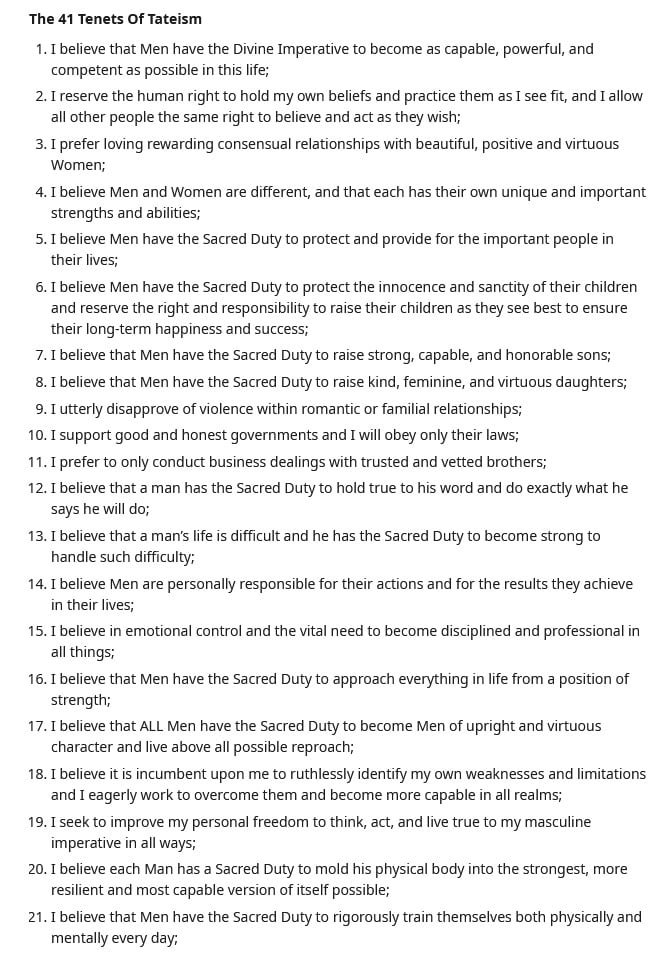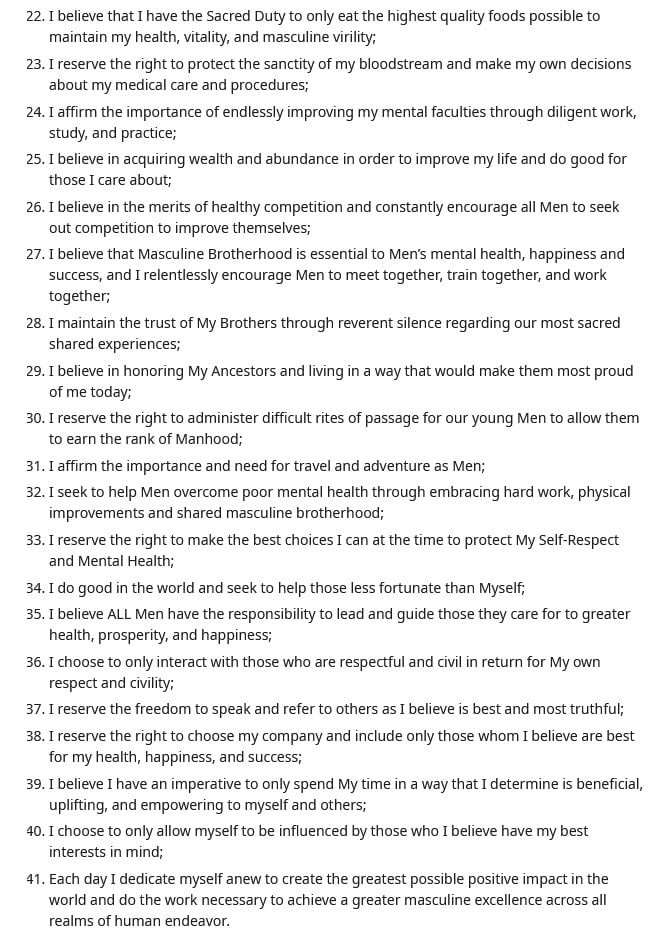It is quite hard to find an article that addresses Andrew Tate in a way that does not involve a large amount of ad hominem attacks, name-calling, and overall outrage. Although this is understandable, it masks a message which is much more subtle than immediately visible: male conformity. In addressing this message that Tate disseminates, I will put aside the misogyny, sexism, and male supremacy issues as these are well documented elsewhere. What I am going to do is to talk of Tate’s message from a man’s perspective and paying particular attention to Tate’s ‘Tenet’s of Tateism’ in the process. Speaking as a man, I find it important to consistently try to improve my own knowledge and I am sure that many other men who follow Andrew Tate also think this way. It is these men I appeal to in this article especially on the grounds that most of Tate’s followers are men.
If you are a supporter of Andrew Tate and are already aware of these tenets then I would advise in this case to pay attention to the tenet which states ‘I affirm the importance of endlessly improving my mental faculties through diligent work, study, and practice’. Keep this tenet in mind reading this article. Also, this is not designed to be a personal attack on Tate and I extend the basic level of respect to him as I would anybody else. Anybody seeking to ‘improve mental faculties’ should know that nothing is above critique, Tate’s work included.
41 Tenets of Tateism
Andrew Tate’s ’41 Tenets of Tateism’ then are essentially a pseudo-ideology. By this, I mean that it is a set of ideas produced by Tate to give the appearance of being a legitimate playbook from which one can order and conduct their lives. Although, if you read them, every single tenet begins with ‘I’ implying that these are his own rules to which he lives his own life by. This kind of leaves open the argument that he has done nothing to influence you. However, it is clear that by publishing them in a book, he intends to share those rules with all of us so that we too can follow them. All 41 tenets are listed here and below are screenshots in case the link goes dead.
The Matrix
Before I address these tenets, I want to draw attention to another concept Tate consistently refers to which is surprisingly absent from these tenets: the ‘matrix’. Tate regularly talks of escaping this ‘matrix’. By ‘matrix’ he means the system in which we live including the media, political, and corporate systems. He argues that this system controls us in ways which are abrasive to our freedoms. Now this is something I can totally agree with and so do many others even if they cannot necessarily explain why. Social controls are well documented in these areas and it really is not a left-wing / right-wing issue although the specific details of what constitutes or manifests as social control may differ between political allegiance.
Many people know that they are inherently trapped in this ‘matrix’ even if they cannot express or convey the ways in which they experience this. When somebody like Tate acknowledges and validates feelings on this matter it can be a powerful message. It certainly speaks to me both as a man and as a human being. However, despite Tate’s acknowledgement of this ‘matrix’, his solutions are catastrophically bad. Rather than help you to escape the matrix, what he does is powerfully and subtly reinforce conformity to that same system and he is making a lot of money selling you back into that same system. Let me explain.
Hidden Messages
Returning back to Andrew Tate’s 41 tenets, there are a number of interconnected key concepts which betray Tate’s own conformity to the ‘matrix’ which is, in turn, sold on to you. These key concepts are:
- Personal responsibility
- Discipline
- Professional
- Resilience
- Self-improvement
- Wealth
- Competition
- Hard work
- Positivity
- Excellence
- Choice
- Strength and weakness
- Freedom
Neoliberalism
One or more of these concepts appears, or is directly implied, in 31 of those 41 tenets. The key concepts noted above which appear within Andrew Tate’s tenets are all concepts which appear in neoliberal ideology. Many of you reading this will already live in a neoliberal system, especially if you live in any developed western country, yet this does not mean that you are aware of it. Neoliberalism is mostly unspoken about, at least outside of academic circles. Nonetheless, neoliberalism is the dominant ideological force in the west.
Neoliberalism is a totalising ideology. In other words, rather than being simply a political ideology or economic ideology, it constitutes an ideology which penetrates every area of life. Tenets of neoliberalism are much more woven into society. The language that we use, the processes we perform, our beliefs, or our choices in life are directed and influenced by neoliberal ideology. A neoliberal matrix even.
Julie Wilson, author of the book Neoliberalism, argues that personal responsibility compels the individual to take more social responsibility. This includes hard work, self-discipline or self-improvement. This comes at the cost of a loss of social provisions. If these seems like common sense, it is because the logic of neoliberalism, an economic logic which is infused into us, makes it seem logical. After all, if we want to have wealth we have to work hard and be disciplined do we not? Yet, in doing so, by internalising this hard-working, self-disciplined, and competitive narrative, we conform to the very demands of that economic logic imposed on us from above. The extravagances of wealth, wrapped in a consumerist way of living, act as the carrot while competition acts as the stick to beat us with to work harder.
Through strength and resilience and a positive mindset, we are told, we can achieve anything. We have freedom of choice to choose our own destiny. To be wealthy, one must just work hard enough. It is a personal choice to be poor. If we take a professional approach to achieving excellence, whatever that is, then wealth will come naturally. This has been described as a ‘cruel optimism’ and embodies not only neoliberal ideology within us, but betrays us through the fallacy that we have a meritocracy.
Male Conformity
This, in a nutshell, is what Andrew Tate espouses. His displays of wealth and narrative of hard-work and discipline betray his own conformity. Tate utilises these ‘common sense’ tenets and attempts to pass them off as his own, albeit likely unintentionally. This is because, unless one becomes familiar with the tenets of the neoliberal, they are hard to see even when they sit in plain sight.
Of course, there are many problems with these central tenets. For example, personal responsibility sees mental health firmly attributed to the individual. It ignores any possibility that a mental health issue could arise from external factors. Similarly, if you fail in your job through lack of needed resources, it is not that the resources you needed were taken away, it is that you failed to assimilate with this lack of resources. If are unemployed, it is not that the system failed in any way such as your employer going bust, it is that you failed to see it coming. If you can’t afford your bills, it is not the increase in the cost of bills or the fact that you are underpaid by an employer but, rather, it is your fault for not getting a better job. It is not the competition between workers under threat of job losses that induces anxiety, it is in you and you alone and is a problem that you need to sort. It is your fault you are overweight, not the constant bombardment and psychological manipulation of junk food companies, the misery of the problems in life, or addiction to food additives that is the problem. You failed to self-discipline.
It is not just in adults where these issues can be seen. The whipping that children receive in education to perform better and younger than ever before is one such example. In order to produce ever greater performance statistics, school funding becomes tied to the performances and outcomes of both children and teachers. Teachers then metaphorically whip the children harder to produce better results, particularly when the teacher’s job becomes dependant on it. Anxiety moves from being a nervousness to being medical grade and is the entirely predictable outcome both in children and teachers. Personal responsibility then means taking responsibility for this issue and we are gaslighted into believing the problem can solved through apps or behavioural therapies which reinforce the idea that if only we change the way we think, this issue will go away. Put simply, it is not the failure of the system that is responsible, but how we react to, internalise, and recover from that failure. As a side note, this is essentially where the recent prevalence of resilience narratives originates.
Competition is also well documented for its negative effect. It compels us to work ever longer hours for less money and not more, it has negative effects on achievement, motivation, and health. Becker, Hartwich & Haslam’s 2021 study traces the substantial reductions in wellbeing through the neoliberal promotion of competition including depression, isolation, stress, and high blood pressure. In other words, all the things that make you miserable.
In returning to Andrew Tate’s tenets then, conformity is happening on two levels. Firstly, in following Tate, you conform to Tate’s personal expectations of how to behave, how to think, and how to live your life. Secondly, in doing so, you are following Tate’s misguided belief that his philosophy is his own, when in actual fact he is espousing the same programming by the same matrix he claims to escape. In turn, in following Tate, you too come to conform to that same matrix and are left to comply with the same demands that made you miserable or dissatisfied in the first place. Meanwhile, you continue to fund the wealth of the man that sells you that same misery.
References
Becker, J. C., Hartwich, L., & Haslam, S. A. (2021). Neoliberalism can reduce well‐being by promoting a sense of social disconnection, competition, and loneliness. British Journal of Social Psychology.
Tate, A. and G, C. (2022). Tateism: The 41 Tenets. Independently published.
Wilson, J. (2018). Neoliberalism. New York, NY: Routledge, an imprint of the Taylor & Francis Group.
Further Reading
Esposito, L., & Perez, F. M. (2014). Neoliberalism and the Commodification of Mental Health. Humanity & Society, 38(4), 414–442.
Franceschelli, M., & Keating, A. (2018). Imagining the future in the neoliberal era: young people’s optimism and their faith in hard work. Young, 26(4_suppl), 1S-17S.
Harvey, D. (2007). A Brief History of Neoliberalism. Oxford University Press.
Tate, A. and G, C. (2022). Tateism: The 41 Tenets. Independently published.
Wilson, J. (2018). Neoliberalism. New York, NY: Routledge, an imprint of the Taylor & Francis Group.














